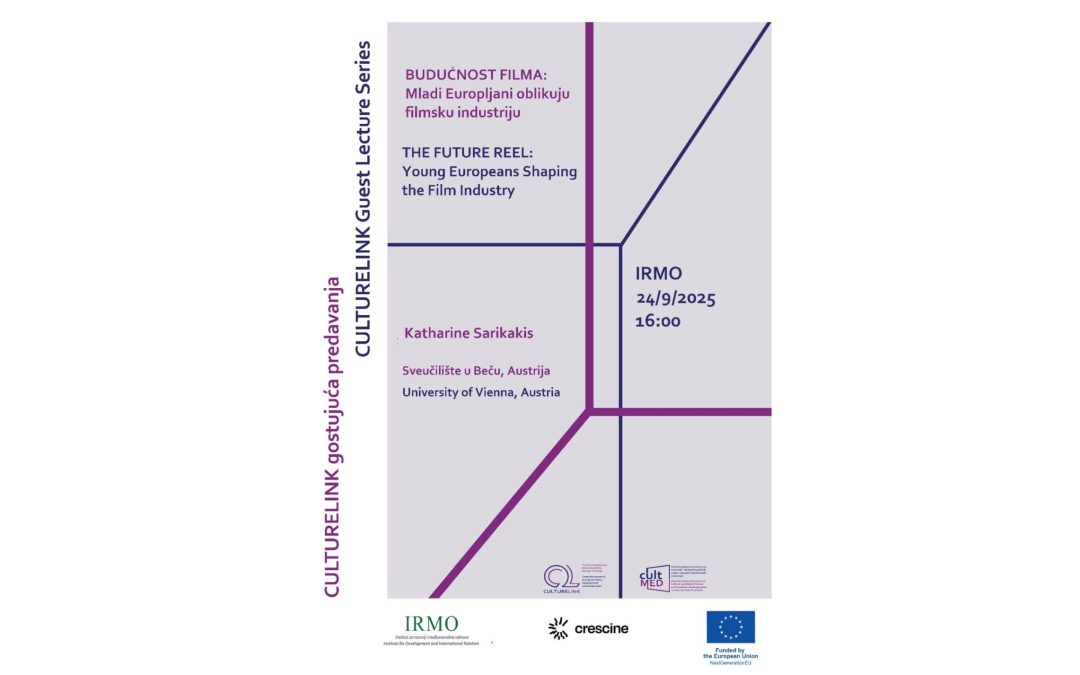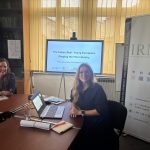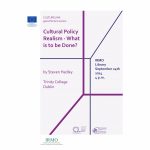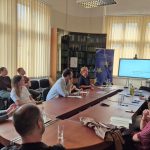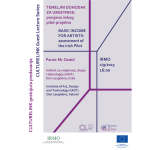As part of the CULTMED project, CULTURELINK – The Centre for Research in Cultural Policy, Development and Cooperation is inviting you to the fifth lecture within the Culturelink Guest Lecture Series, which will be held on Wednesday, September 24, 2025, at 4 p.m. in the library of the Institute for Development and International Relations (IRMO). Lecturer and researcher in communication science, Katharine Sarikakis, will hold a lecture entitled “The Future Reel: Young Europeans Shaping the Film Industry”.
The lecture will provide an overview of how young people are both the present and the future of cultural creative industries, dynamically shaping creative sectors such as the film industry. Existing literature on the role of children and young people as young audiences and consumers underlines the lack of studies capturing youth’s voices and providing a comprehensive understanding of young people’s perceptions on preferences, interests and challenges, regarding film consumption and engagement with film-related interactions, which range from film clubs to filmmaking itself. To address this gap, the current REBOOT project study uses mixed-methods, combining survey data of 4.453 responses and focus group interviews of 508 young people aged 12 to 24 from nine countries: Austria, Belgium, Finland, France, Greece, Italy, Poland, Spain and Türkiye.
The findings of the study point out that young people’s preferences are associated with emotional attachment and films with which they can feel related and connected and evoke strong emotional responses, inspiration and personal projection. Young audiences value complex and alternative film narratives, nostalgic films related to their childhood and authenticity over artificial storytelling. Additionally, young people are not restrained to film consumption but rather adopt an interactive approach to film by generating conversations via sharing film-related cultural perceptions and experiences on social media platforms. Similarly, platforms like Letterboxd provide space for active engagement in a collective meaning-making of the movie.
A further layer of interaction with films is young people’s engagement with video- and even filmmaking. Film production is a multifaceted process combining from the one hand, skills development and professional exploration and expanding on the other hand, to creativity boundaries, identity discovery, self-expression and social engagement. Finally, young people are shifting learning paradigms towards the democratisation of video and filmmaking education through autodidactic models and everyday equipment, such as smartphones, generating an informal, alternative and self-motivated creative path.
This lecture is organised in collaboration with the CresCine project, on which you can find out more at: https://www.crescine.eu/
The lecture will be held in English. Please sign up to attend the lecture by September 22, 2025, to kultura@irmo.hr.
Katharine Sarikakis is Professor of Communication Science with specialisation in Media Governance, Media Organisation and Media Industries at the Department of Communication, University of Vienna, Austria. She leads the Media Governance and Industries Research Lab, which aims to research and analyse issues, contexts, actors and impacts of media and cultural governance and their underexplored interconnections to citizenship, autonomy and control as they are articulated in the shapes of media landscapes and the relation of citizens-at-large to dimensions of interlocution. Prof. Sarikakis has served the academic community continuously in elected leadership positions since 1998 as the founder and then chair of the Emerging Scholars Network of the International Association of Media and Communication researchers (IAMCR). She was the youngest ever elected vice-president of the IAMCR, which held Consultant Level A with UNESCO in 2000. Prof. Sarikakis has also served as elected Chair and Vice Chair of the Communication Law and Policy Division of the International Communication Association (ICA); the founding and twice elected Chair of the Communication Law and Policy Section of the European Communication Research and Education Association (ECREA). She has also served as an elected member of the ECREA Executive Board and as an elected Member of the International Council of IAMCR. She is the Co-Editor of the International Journal of Media and Cultural Politics. More information can be found here.

